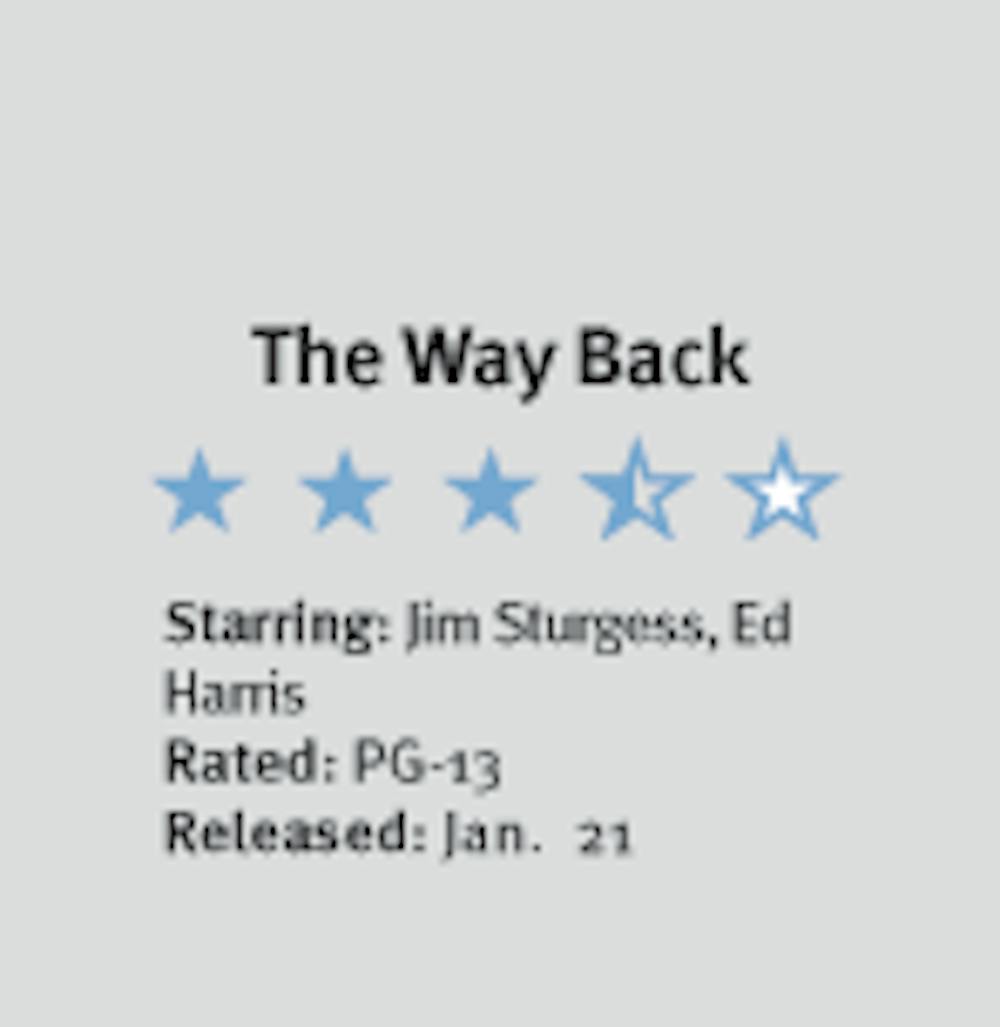The Way Back: fine acting breathtaking scenery

Films glorify many things, but walking is not one of them. We prefer our films at faster speeds then that of the pedestrian. Peter Weir's new film, The Way Back, based on the book The Long Walk, is exactly that: an odyssey through some of the most desolate, inhospitable and beautiful places on Earth. The film concerns a group of inmates in a Siberian gulag in 1941, who escape and trek southward through the mountains of Siberia, the steppe of Mongolia, the Gobi Desert of China and the Himalayas of Nepal to their freedom in India. The film begins with the Polish Janusz (Jim Sturgess, 21) in an interrogation chamber listening to his wife recite an obviously forced confession that dooms him to 20 years in a brutal work camp. Upon his arrival at the gulag, the warden recites the "nature is your jailer" speech, a standard in all escape movies ranging from The Bridge on the River Kwai to Star Trek VI.
As Janusz hears the Soviet official talk about the desolate land, he looks into the foreboding and snowy forest, not with fear but with hope. It is a haunting and beautiful take on a cinema standard and stands as one of the movie's strong points. Janusz soon meets other prisoners with his conviction, Tomasz the artist (Alexandru Potocean, Silent Wedding), Zoran the accountant (Dragos Bucur, Summer Holiday), Kazik the blind man (Sebastian Urzendowsky, The Counterfeiters), the cruel criminal Valka (Colin Farrell, In Bruges) and an enigmatic American known only as Mr. Smith (Ed Harris, A History of Violence).
After trading for limited food and supplies, the motley band escapes into the blizzard. The rest of the movie could be simply a quest for survival, but when runaway Irena (Saoirse Ronan, Atonement) begins to ask questions, the group begins to develop close relationships.
The actors do a superb job looking absolutely miserable. The story requires a lot of shivering and dehydration, and the actors rise to the challenge of communicating their desires when conditions rob them of articulation. Sturgess convincingly shows Janusz's drive for freedom, and Ronan somehow maintains an enigmatic beauty while her skin becomes blistered and swollen with exposure.
The greatest performance, though, goes to Harris' depiction of Mr. Smith. He never truly loses his gruff and abrasive "cowboy" demeanor, but we can definitely feel his paternal affection ?toward Irena.
The true stars of the film, though, are the amazing vistas and landscapes. While the movie was not actually filmed in every location, you would never know it. It is not surprising that the film was partially a National Geographic production, as watching it feels like gawking at full-color spreads of exotic places, and Weir gives us ample time to soak it in. Burkhard von Dallwitz's symphonic score adds to this sense of transcendentalism.
The directing does take a turn for the worse near the end of the film, with an awkward and ill-fitting montage of common knowledge Cold War history.
Despite the sour taste that this poorly executed scene leaves in the mouth, the film still survives as an epic tale of human spirit. The film moves at a slow walking pace, so those looking for an action-packed chase through the wilderness will leave disappointed. The movie shows that man can triumph not only over the trials of nature but also the tyranny of other men.
More from The Rice Thresher

Over 1,000 students petition against new meal plan
When Konstantin Savvon opened the Housing and Dining email announcing the new unlimited meal plan, he was instantly concerned about the impact on off-campus students like himself.

Rice football wins season opener under new coach
For the first time since 2018, Rice football opened its season with a victory. Scott Abell was soaked with yellow Powerade following a 14-12 win on the road Saturday against the University of Louisiana at Lafayette, which won 10 games and made it to the Sun Belt Conference championship last season.

Acting like an athlete: Rice basketball alum takes on Broadway
Underneath Chadd Alexander’s Broadway costume, there’s ankle tape and wrist braces — same protective gear he wore as a walk-on basketball player at Rice, though now he’s performing eight shows a week in the ensemble of “Harry Potter and the Cursed Child” instead of running conditioning drills in Tudor Fieldhouse.

Please note All comments are eligible for publication by The Rice Thresher.